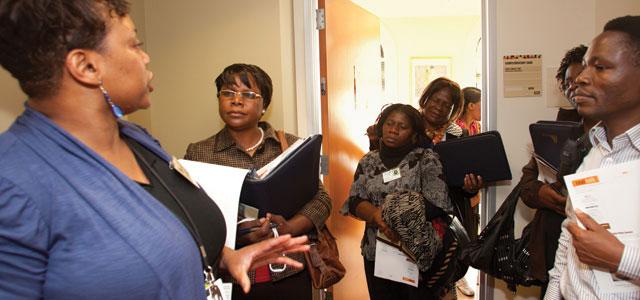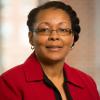
Nurse practitioner Esker-D Ligon (far left) leads a tour of Glide Health Services for Malawi fellows Angela Chimwaza, Maria Chikalipo, Alice Bvumbwe and Spy Munthali (photo by Elisabeth Fall).
Serving Marginalized Populations from Malawi to San Francisco
In 2011, a group of 12 health care providers from Malawi, including nine nurses, visited San Francisco as part of a project aimed at exchanging ideas about how to address the health care needs of marginalized and underserved populations. UCSF School of Nursing Associate Dean for International Programs and Global Health Sally Rankin and University of Alabama at Birmingham (UAB) School of Nursing Assistant Dean for International Affairs Lynda Wilson had secured a grant from the Fulbright Foundation for the project, which funds the exchange of Fulbright fellows between the United States, Malawi and Zambia.
The Malawi fellows spent two weeks in and around San Francisco, visiting nurse-led programs serving vulnerable populations. They saw programs at Glide Health Services, a UCSF nurse practitioner-managed clinic; the Gamble Institute, a program co-founded by School of Nursing alumna Elizabeth Marlow that assists parolees with reintegration into society; the Department of Family Health Care Nursing teen pregnancy clinic; and San Francisco General Hospital’s nurse-midwifery service. Sub-Saharan Africa – and Malawi in particular – has some of the highest maternal and perinatal mortality rates in the world, and many of Malawi’s nurses also serve as midwives.
UCSF faculty hosted the visitors in their homes, and in July, a contingent of UCSF faculty traveled to Malawi to continue the exchange and help the Malawi fellows implement some of the ideas they had taken away from their visit. The Malawi visit included workshops to help faculty get research published in peer-reviewed publications and curriculum development for a nursing PhD program at Kamuzu College of Nursing, part of the University of Malawi.
The exchange was educational for both groups of scholars, says Rankin, because it furthered understanding of the cultural differences that can affect health and the delivery of care.
Greater cultural understanding, says Rankin, can lead to more fruitful collaboration. “Different groups are marginalized in Malawi, and it’s much more likely to be based on things like tribe or urban-versus-rural lifestyle than on homelessness or race,” she says.
Limited resources are a problem familiar to those who work with marginalized populations in both the United States and Malawi, and ideas that work well in one setting may transfer well to another, but they may need to be modified to fit different conditions. “It was helpful for us to see what kinds of unique challenges face health care workers there,” Rankin adds.
As part of the project, a similar exchange took place between 13 health care workers from Zambia and faculty from UAB, and another group of fellows from Malawi is scheduled to visit Alabama and San Francisco in October and November 2011. A second contingent of UCSF faculty will go to Malawi in June 2012.



